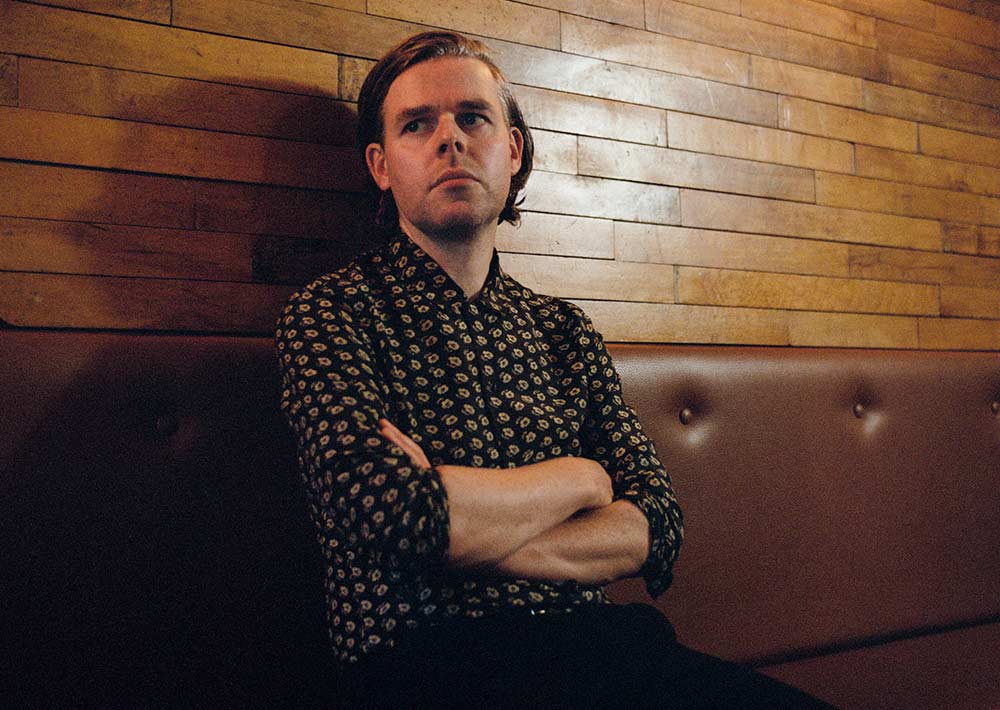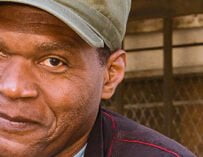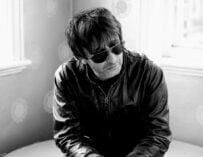
Arborist AKA : “There are occasions when I feel I need another voice to get into a song and I imagine it being sung in the style of other artists I admire.” Photo: Aaron Cunningham
Mark McCambridge on ‘An Endless Sequence Of Dead Zeros’ and working with Matthew E. White and the Spacebomb House Band
With two critically-acclaimed albums already under his belt, Belfast’s Mark McCambridge is showing no sign of resting on his consummate laurels. Building on the foundations laid by 2016’s Home Burial and 2020’s A Northern View (a Northern Ireland Music Prize nominee), the new Arborist record, An Endless Sequence Of Dead Zeros, is a mellifluous gift from first note to last – think Fleet Foxes with a more robust rhythm section and greater desire to expand their horizons.
Textured in both sound and substance, the album was produced by Matthew E. White at Spacebomb Studio in Richmond, Virginia. Featuring the Spacebomb House Band, formidable players such as Trey Pollard were able to augment the ideas McCambridge brought to the sessions. Lyrical inspiration stretches from the Belfast riots of 2021(Alabaster Skin) to a book written by expert in post-traumatic stress Bessel van der Kolk (The Body Keeps Score), and it’s an assortment of themes that reveal different sides of themselves with each new listen.
With so much to discover, we tracked down McCambridge to learn all about how the album came together…
Click here for more interviews
Now that you’re on your third album, are there things you deliberately did to switch up the writing process, or do you have a set method that you always use?
“The approach to writing this album was significantly different to the previous two, largely due to circumstance. In 2020, the tail end of the A Northern View tour was cut short by lockdown and, with the next few years not being conducive to having everyone from the previous Arborist iteration in a room together, I began thinking about alternatives.
“The idea was that I would prepare the songs meticulously so that, as soon as was possible, I could walk straight into a studio. A session band suited this idea best, which meant writing the songs with that in mind (gaps for solos, non-fading outros etc.). Above all else, I felt that I was pushing myself beyond what was comfortable and that was a good thing.”
At what point in the process do you decide what a finished song should sound like?
“I have a fair idea from the moment I first demo the song. Then, as referenced in Matisse, it’s a series of decisions and compromises to get to the final product. For this record, I had things fairly well fleshed-out in my demos, I like to take a song to about 90% of completion allowing for a certain amount of happenstance during the recording itself.
“Those decisions and compromises, in terms of edits, takes, overdubs, had to be made during the eight days at Spacebomb Studios, so choosing what the finished song should be was often a spare of the moment call based on ‘feel’.”

Arborist: “A new piece of music or melody may feel as though it merits fresh words.” Photo: Aaron Cunningham
What did Matthew E. White bring out of you/add to your songwriting?
“I was a fan of Matthew E White’s music and was aware of his Spacebomb Studios through great albums by Nadia Reid, Natalie Prass and Bedouine, so there was a keen sense of trust before the session even began. I knew my songs were in safe hands.
“The schedule was so intense that our relationship was based upon the work itself and getting the absolute best/most out of the time we had in the studio. Matthew rarely stands on your toes, gives you all the room you need to work and quietly guides the entire process.
“A lot of the magic seemed to be in Matthew’s relationship with his engineer, Alex De Jong, and the Spacebomb House Band. There was an ability to communicate what I was trying to convey tacitly to the band, or in just a few concise words. This gave me the space to concentrate on my own performance.”
What opportunities did working with Trey Pollard and the other members of the Spacebomb House Band afford you?
“Trey Pollard was a big part of the appeal of working at Spacebomb. Again, I trusted him with the songs. The brass and woodwind (Unkind and Dewdrop Cherryoak) were based on melodies I had demoed and Trey gave them the right mood and harmony, but the luscious, lyrical strings are all his.
“The band are evidently fantastic players which provoked a certain amount of ‘impostor syndrome’ in me before the trip. Though, reassuringly, I found that a musician’s approach to creativity is similar wherever you go; it often takes a spark or just good old-fashioned graft. I felt comfortable in the surroundings and gave the band a lot of freedom to express themselves.”
Do you hear words in your singing voice as you’re writing them?
“There are occasions when I feel I need another voice to get into a song and I imagine it being sung in the style of other artists I admire. This otherness can help to get oneself into a different headspace lyrically and melodically but is always tethered to your own voice.
“I often have a lot of lyrics to dip into when writing a song though a new piece of music or melody may feel as though it merits fresh words. In this case the lyrics will be dictated by many things from cadence to the number of syllables. This method can be a little more painstaking, a delicate hammer and chisel approach is required.”

Arborist’s Mark McCambridge: “Never stop writing. Even in barren times, keep going to the coalface.” Photo: Aaron Cunningham
Do you do much research into the subjects you’re writing about, or is it more of an emotional response to things you’re already feeling?
“It’s largely an emotional response though I am very conscious about the angle I approach it from. There is of course a lot of the personal on the record but I hope I’ve achieved that with different voices which gives a sense of the universal.
“Alabaster Ski was prompted by rioting in Belfast during lockdown. Old paramilitaries steeped in the bitter bigotries of the past goading youngsters into fights. I was trying to convey the fact that things have changed and a new generation is coming who just don’t deal in those terms. The last line is supposed to offer a cyclical nature to the record and to feel mildly redemptive.”
Is there anything else you do to tease inspiration out from beneath the covers?
“I write a lot of words. Not all of it coherent but I find it helps, in fallow times especially. But few things work better than simply listening to music. Several times a day, to several different records, I find myself utter, ‘Now that’s the kind of song I want to write!’”
Are you someone who blocks out time for your creativity or are you always writing, or at least always collecting ideas for songs?
“Always collecting ideas, yes. I have a family so setting time aside is often well-intentioned but rarely fulfilled. I am of the belief that it is important to live it and commit to it fully, keep the window at least ajar at all times.”
O Margaret is one of our absolute favourites from An Endless Sequence Of Dead Zeros – please could you tell us a little about how it was written/came together?
“I see O Margaret as a collection of three memories over the three verses that the listener floats through. They are hopefully occult enough to feel dreamlike but with enough rich imagery to latch onto.
“Trey and I discussed having something quite nebulous swirling around my guitar and he created something above and beyond what I could’ve imagined. The song is in Ab major but Trey had the orchestra play to a sped-up version in A major in order to get the right sweeping feel. It was bounced down to tape, slowed-down to Ab and bounced back to digital. It gives it a warm shimmer, I feel.”
Lastly, do you have a songwriting tip that you can share with us?
“Never stop writing. Even in barren times, keep going to the coalface, it may seem like utter drivel but it is often the only way out of a rut. And at any other time, even when things are flowing, being able to dip into a reserve to spark an idea is invaluable.”
The new album by Arborist, An Endless Sequence Of Dead Zeros, is out now. Arborist will be playing shows in London, Durham, North Shields and Glasgow later this month. For dates and tickets, head to arboristmusic.com
Click here for more interviews




































Related Articles